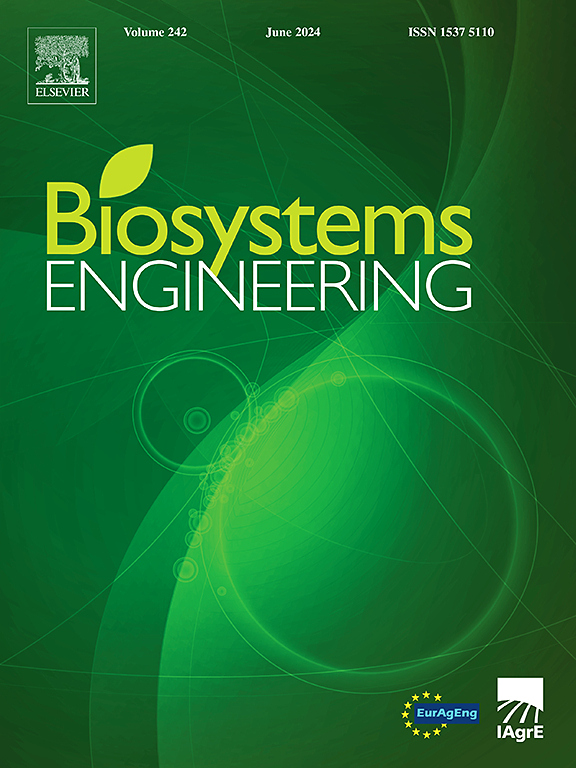CKSP: Cross-species knowledge sharing and preserving for universal animal activity recognition
IF 5.3
1区 农林科学
Q1 AGRICULTURAL ENGINEERING
引用次数: 0
Abstract
Deep learning techniques are dominating automated animal activity recognition (AAR) tasks with wearable sensors due to their high performance on large-scale labelled data. However, current deep learning-based AAR models are trained solely on datasets of individual animal species, constraining their applicability in practice and performing poorly when training data are limited. In this study, a one-for-many framework is proposed, dubbed Cross-species Knowledge Sharing and Preserving (CKSP), based on sensor data from diverse animal species. Given the coexistence of generic and species-specific behavioural patterns among different species, a Shared-Preserved Convolution (SPConv) module is designed. This module assigns an individual low-rank convolutional layer to each species for extracting species-specific features and employs a shared full-rank convolutional layer to learn generic features. This enables the CKSP framework to learn inter-species complementarity and alleviates data limitations via increasing data diversity. Considering the training conflict arising from discrepancies in data distributions among species, a Species-specific Batch Normalisation (SBN) module is devised that involves multiple BN layers to separately fit the distributions of different species. To validate CKSP's effectiveness, experiments are performed on three public datasets from horses, sheep, and cattle, respectively. The results show that this approach remarkably boosts the classification performance compared to the baseline method (one-for-one framework) solely trained on individual-species data, with increments of 6.04 %, 2.06 %, and 3.66 % in accuracy, and 10.33 %, 3.67 %, and 7.90 % in F1-score for the horse, sheep, and cattle datasets, respectively. This proves the promising capabilities of the method in leveraging multi-species data to augment classification performance.
CKSP:跨物种知识共享和保护,用于普遍的动物活动识别
深度学习技术由于其在大规模标记数据上的高性能,在可穿戴传感器的自动动物活动识别(AAR)任务中占据主导地位。然而,目前基于深度学习的AAR模型仅在单个动物物种的数据集上进行训练,这限制了其在实践中的适用性,并且在训练数据有限的情况下表现不佳。在本研究中,基于不同动物物种的传感器数据,提出了一个“一对多”的框架,称为跨物种知识共享和保护(CKSP)。考虑到不同物种间的共性行为模式和物种特异性行为模式并存,设计了共享保存卷积(SPConv)模型。该模块为每个物种分配一个单独的低阶卷积层来提取物种特有的特征,并使用一个共享的全阶卷积层来学习通用特征。这使得CKSP框架能够学习物种间的互补性,并通过增加数据多样性来缓解数据限制。考虑到物种间数据分布差异引起的训练冲突,设计了一个物种特异性批归一化(SBN)模块,该模块涉及多个批归一化层,分别拟合不同物种的分布。为了验证CKSP的有效性,分别在马、羊和牛的三个公共数据集上进行了实验。结果表明,与单物种数据训练的基准方法(一对一框架)相比,该方法的分类准确率分别提高了6.04%、2.06%和3.66%,马、羊和牛的f1得分分别提高了10.33%、3.67%和7.90%。这证明了该方法在利用多物种数据来增强分类性能方面的潜力。
本文章由计算机程序翻译,如有差异,请以英文原文为准。
求助全文
约1分钟内获得全文
求助全文
来源期刊

Biosystems Engineering
农林科学-农业工程
CiteScore
10.60
自引率
7.80%
发文量
239
审稿时长
53 days
期刊介绍:
Biosystems Engineering publishes research in engineering and the physical sciences that represent advances in understanding or modelling of the performance of biological systems for sustainable developments in land use and the environment, agriculture and amenity, bioproduction processes and the food chain. The subject matter of the journal reflects the wide range and interdisciplinary nature of research in engineering for biological systems.
 求助内容:
求助内容: 应助结果提醒方式:
应助结果提醒方式:


